
ABOUT THE NEW IMPERIALISM
The New Imperialism is the title of both
a
seminar offered by Maximilian Forte, and
a
publication series which he edits and
publishes. Forte established
Alert Press as a non-profit means of
publishing student research, following in the
tradition established by Stories from Montreal,
in Concordia University’s Department of
Sociology and Anthropology. In both cases, the
aim is to publish high quality, independent
student research as a further incentive to
develop research and writing skills for students
engaged in knowledge production. See the
publisher website for more about the following
volumes released thus far, or click on the
individual book cover images and titles below.

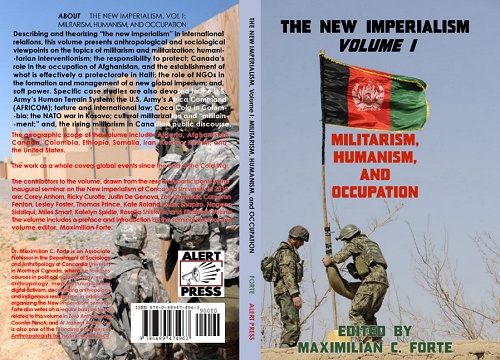 Describing
and theorizing “the new imperialism”¯ in
international relations, this volume presents
anthropological and sociological viewpoints on
the topics of militarism and militarization;
humanitarian interventionism; the responsibility
to protect; Canada’s role in the occupation of
Afghanistan, and the establishment of what is
effectively a protectorate in Haiti; the role of
NGOs in the formation and management of a new
global imperium; and, soft power. Specific case
studies are also devoted to the U.S. Army’s
Human Terrain System; the U.S. Army’s Africa
Command (AFRICOM); torture and international
law; Coca-Cola in Colombia; the NATO war in
Kosovo; cultural militarization and
“militainment”¯; and, the rising militarism in
Canadian public discourse.
Describing
and theorizing “the new imperialism”¯ in
international relations, this volume presents
anthropological and sociological viewpoints on
the topics of militarism and militarization;
humanitarian interventionism; the responsibility
to protect; Canada’s role in the occupation of
Afghanistan, and the establishment of what is
effectively a protectorate in Haiti; the role of
NGOs in the formation and management of a new
global imperium; and, soft power. Specific case
studies are also devoted to the U.S. Army’s
Human Terrain System; the U.S. Army’s Africa
Command (AFRICOM); torture and international
law; Coca-Cola in Colombia; the NATO war in
Kosovo; cultural militarization and
“militainment”¯; and, the rising militarism in
Canadian public discourse.
The geographic scope of the volume includes
Algeria, Afghanistan, Canada, Colombia,
Ethiopia, Somalia, Iran, Kosovo, Kuwait, and the
United States.
The work as a whole covers global events since
the end of the Cold War.
The contributors to the volume, drawn from the
research participants in the inaugural seminar
on the New Imperialism at Concordia University
in 2010, are: Corey Anhorn, Ricky Curotte,
Justin De Genova, Zoe Dominiak, Cameron Fenton,
Lesley Foster, Thomas Prince, Kate Roland, Mark
Shapiro, Nageen Siddiqui, Miles Smart, Katelyn
Spidle, Rosalia Stillitano, and Elizabeth Vezina.
The volume includes a preface and introduction
by the seminar director and volume editor,
Maximilian Forte.

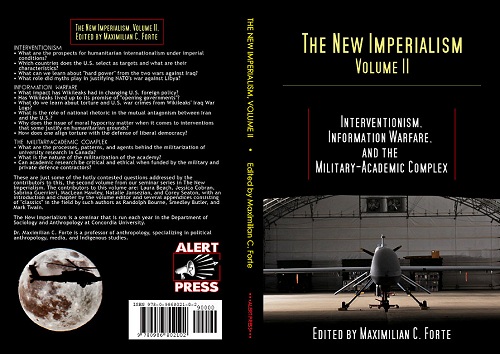 Interventionism
Interventionism
● What are the prospects for humanitarian
internationalism under imperial conditions?
● Which countries does the U.S. select as
targets and what are their characteristics?
● What can we learn about “hard power”¯ from the
two wars against Iraq?
● What role did myths play in justifying NATO's
war against Libya?
Information Warfare
● What impact has Wikileaks had in changing U.S.
foreign policy?
● Has Wikileaks lived up to its promise of
“opening governments”¯?
● What do we learn about torture and U.S. war
crimes from Wikileaks’ Iraq War Logs?
● What is the role of national rhetoric in the
mutual antagonism between Iran and the U.S.?
● Why does the issue of moral hypocrisy matter
when it comes to interventions that some justify
on humanitarian grounds?
● How does one align torture with the defense of
liberal democracy?
The Military-Academic Complex
● What are the processes, patterns, and agents
behind the militarization of university research
in Canada?
● What is the nature of the militarization of
the academy?
● Can academic research be critical and ethical
when funded by the military and private defence
contractors?
These are just some of the hotly contested
questions addressed by the contributors to this,
the second volume from our seminar series in The
New Imperialism. The contributors to this volume
are: Laura Beach, Jessica Cobran, Sabrina
Guerrieri, MacLean Hawley, Natalie Jansezian,
and Corey Seaton, with an introduction and
chapter by the volume editor and several
appendices consisting of “classics”¯ in the
field by such authors as Randolph Bourne,
Smedley Butler, and Mark Twain.

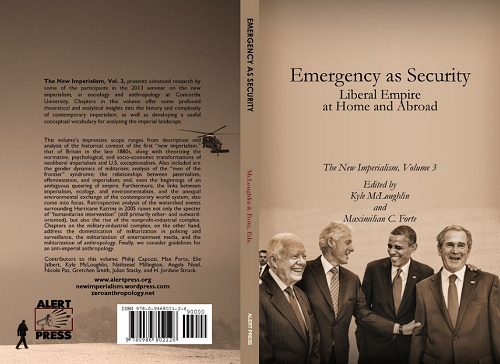 The
third volume, presents advanced research by some
of the participants in the 2013 seminar on the
new imperialism, in sociology and anthropology
at Concordia University. Chapters in this volume
offer some profound theoretical and analytical
insights into the history and complexity of
contemporary imperialism, as well as developing
a useful conceptual vocabulary for analyzing the
imperial landscape. This volume’s impressive
scope ranges from description and analysis of
the historical context of the first “new
imperialism,”¯ that of Britain in the late
1880s, along with theorizing the normative,
psychological, and socio-economic
transformations of neoliberal imperialism and
U.S. exceptionalism. Also included are the
gender dynamics of militarism; analysis of the
“men of the frontier”¯ syndrome; the
relationships between paternalism, feminization,
and imperialism; and, even the beginnings of an
ambiguous queering of empire. Furthermore, the
links between imperialism, ecology, and
environmentalism, and the unequal environmental
exchange of the contemporary world system, also
come into focus. Retrospective analysis of the
watershed events surrounding Hurricane Katrina
in 2005 raises not only the spectre of
“humanitarian intervention”¯ (still primarily
other- and outward-oriented), but also the rise
of the nonprofit-industrial complex. Chapters on
the military-industrial complex, on the other
hand, address the domestication of
militarization in policing and surveillance, the
militarization of entertainment media, and the
militarization of anthropology. Finally, we
consider guidelines for an anti-imperial
anthropology.
The
third volume, presents advanced research by some
of the participants in the 2013 seminar on the
new imperialism, in sociology and anthropology
at Concordia University. Chapters in this volume
offer some profound theoretical and analytical
insights into the history and complexity of
contemporary imperialism, as well as developing
a useful conceptual vocabulary for analyzing the
imperial landscape. This volume’s impressive
scope ranges from description and analysis of
the historical context of the first “new
imperialism,”¯ that of Britain in the late
1880s, along with theorizing the normative,
psychological, and socio-economic
transformations of neoliberal imperialism and
U.S. exceptionalism. Also included are the
gender dynamics of militarism; analysis of the
“men of the frontier”¯ syndrome; the
relationships between paternalism, feminization,
and imperialism; and, even the beginnings of an
ambiguous queering of empire. Furthermore, the
links between imperialism, ecology, and
environmentalism, and the unequal environmental
exchange of the contemporary world system, also
come into focus. Retrospective analysis of the
watershed events surrounding Hurricane Katrina
in 2005 raises not only the spectre of
“humanitarian intervention”¯ (still primarily
other- and outward-oriented), but also the rise
of the nonprofit-industrial complex. Chapters on
the military-industrial complex, on the other
hand, address the domestication of
militarization in policing and surveillance, the
militarization of entertainment media, and the
militarization of anthropology. Finally, we
consider guidelines for an anti-imperial
anthropology.
Contributors to this volume: Philip Capozzi, Max
Forte, Elie Jalbert, Kyle McLoughlin, Nathaniel
Millington, Angela Noel, Nicole Pas, Gretchen
Smith, Julian Stasky, and H. Jordane Struck.

GOOD
INTENTIONS: Norms and Practices of Imperial
Humanitarianism
The New Imperialism, Volume IV
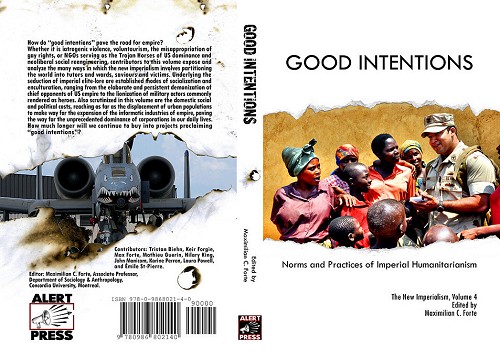 How
do “good intentions”¯ pave the road for empire?
Whether it is iatrogenic violence, voluntourism,
the misappropriation of gay rights, or NGOs
serving as the Trojan Horses of US dominance and
neoliberal social reengineering, contributors to
this volume expose and analyze the many ways in
which the new imperialism involves partitioning
the world into tutors and wards, saviours and
victims. Underlying the seduction of imperial
elite-lore are established modes of
socialization and enculturation, ranging from
the elaborate and persistent demonization of
chief opponents of US empire to the lionization
of military actors commonly rendered as heroes.
Also scrutinized in this volume are the domestic
social and political costs, reaching as far as
the displacement of urban populations to make
way for the expansion of the informatic
industries of empire, paving the way for the
unprecedented dominance of corporations in our
daily lives.
How
do “good intentions”¯ pave the road for empire?
Whether it is iatrogenic violence, voluntourism,
the misappropriation of gay rights, or NGOs
serving as the Trojan Horses of US dominance and
neoliberal social reengineering, contributors to
this volume expose and analyze the many ways in
which the new imperialism involves partitioning
the world into tutors and wards, saviours and
victims. Underlying the seduction of imperial
elite-lore are established modes of
socialization and enculturation, ranging from
the elaborate and persistent demonization of
chief opponents of US empire to the lionization
of military actors commonly rendered as heroes.
Also scrutinized in this volume are the domestic
social and political costs, reaching as far as
the displacement of urban populations to make
way for the expansion of the informatic
industries of empire, paving the way for the
unprecedented dominance of corporations in our
daily lives.
How much longer will we continue to buy into
projects proclaiming “good intentions”¯?
Contributors to this volume: Tristan Biehn, Keir
Forgie, Max Forte, Mathieu Guerin, Hilary King,
John Manicom, Karine Perron, Laura Powell, Emile
St-Pierre.
A
slide presentation, based on the chapter dealing
with Pentagon photography is below:

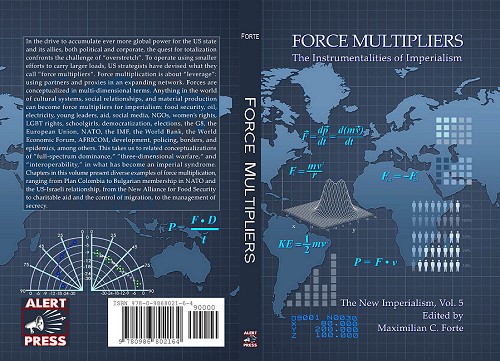 Friends
and allies, partners and protégés, extensions
and proxies—the vocabulary of US power in the
form of multiples of itself has become so
entrenched that it rarely attracts attention,
and even less so does it attract critical
commentary. Force multiplication is about
“leverage”¯: using partners and proxies in an
expanding network, but where power still remains
centralized. Forces are conceptualized in
multi-dimensional terms. Anything in the world
of cultural systems, social relationships, and
material production can become force multipliers
for imperialism: food security, oil,
electricity, young leaders, aid, social media,
NGOs, women’s rights, schoolgirls,
democratization, elections, the G8, the European
Union, NATO, the IMF, the World Bank, the World
Economic Forum, AFRICOM, development, policing,
borders, and epidemics, among others. This takes
us to related conceptualizations of
“full-spectrum dominance,”¯ “three-dimensional
warfare,”¯ and “interoperability,”¯ in what has
become an imperial syndrome. Chapters in this
volume present diverse examples of force
multiplication, ranging from Plan Colombia to
Bulgarian membership in NATO and the US-Israeli
relationship, from the New Alliance for Food
Security to charitable aid and the control of
migration, to the management of secrecy.
Friends
and allies, partners and protégés, extensions
and proxies—the vocabulary of US power in the
form of multiples of itself has become so
entrenched that it rarely attracts attention,
and even less so does it attract critical
commentary. Force multiplication is about
“leverage”¯: using partners and proxies in an
expanding network, but where power still remains
centralized. Forces are conceptualized in
multi-dimensional terms. Anything in the world
of cultural systems, social relationships, and
material production can become force multipliers
for imperialism: food security, oil,
electricity, young leaders, aid, social media,
NGOs, women’s rights, schoolgirls,
democratization, elections, the G8, the European
Union, NATO, the IMF, the World Bank, the World
Economic Forum, AFRICOM, development, policing,
borders, and epidemics, among others. This takes
us to related conceptualizations of
“full-spectrum dominance,”¯ “three-dimensional
warfare,”¯ and “interoperability,”¯ in what has
become an imperial syndrome. Chapters in this
volume present diverse examples of force
multiplication, ranging from Plan Colombia to
Bulgarian membership in NATO and the US-Israeli
relationship, from the New Alliance for Food
Security to charitable aid and the control of
migration, to the management of secrecy.
Contributors to this volume: John Talbot,
Mandela Coupal Dalgleish, Robert Majewski, Lea
Marinova, Chloe Blaszkewycz, Ileana Gutnick, and
Maximilian C. Forte.
There is also a version of the key arguments of
the book presented as a series of slides in this
online presentation: